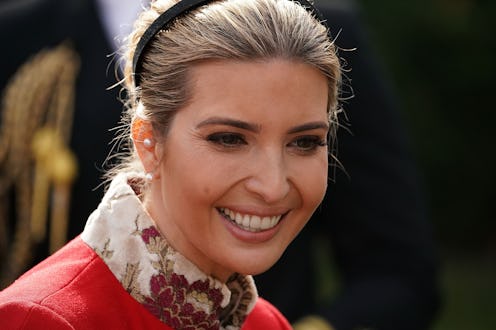
The much-anticipated 2018 Winter Olympics in PyeongChang, South Korea is about to kickoff with great fanfare. As people around the world get ready to tune in to watch the athletes, many are also looking to see which high-profile individuals have decided to attend. One of those individuals at the Olympics will be none other than Ivanka Trump — in fact, she's leading presidential delegation.
Ivanka was always a much-desired guest at the 2018 Olympic games. Back in Nov. 2017, Lee Hee-beom, the president and CEO of the PyeongChang Olympics organizing committee, particularly noted that South Korea wanted the American first daughter and first lady to attend the Games. As Lee noted in an article in USA Today, "It would be an honor for us to have the First Lady and the First Daughter, Ivanka ... Hopefully they can participate. It would very meaningful for us to have them.”
President Trump's Olympics delegation includes Vice President Mike Pence, his wife, Karen, Trump's daughter, Ivanka, and several other high-level U.S. officials. U.S. presidents historically nominate delegations featuring groups of prominent Americans to support Team USA at the Games and to represent the country to the host nation. Often, presidential delegations attend ceremonies and athletic competitions as well as meet with American athletes.
Those who make up a presidential delegation to the Olympics vary significantly from Olympics to Olympics and president to president. For example, during the Olympic Games that fell during his presidency, former president Barack Obama appointed quite varied presidential delegations. For the London Summer Olympics in 2012, Obama selected his wife, former First Lady Michelle Obama, to lead the delegation. In 2014, he sent a group of prominent individuals to Sochi, Russia as the U.S. delegation for the Winter Olympics, but did not include any high-level executive officials in the group.
Some experts believe that presidential delegations to the Olympics are veiled political statements. Indeed, an article in ThinkProgress suggested that Obama's 2014 Sochi delegation served as a condemnation of Russia's human rights record, as the delegation featured two prominent openly gay Americans (Russia has an abysmal record on gay rights). Obama's delegation to the 2016 Games in Brazil, which was led by former Secretary of State John Kerry, was also perceived by some as a condemnation of Brazil's government, considering that neither the former president or vice president, nor their families, were represented in the delegation.
It's somewhat surprising that Trump has nominated such a high level delegation to attend the 2018 Games in South Korea, particularly considering that the White House had initially wavered in whether or not it would even allow American athletes to attend the Winter Games.
On Dec. 7, 2017, the United States' Ambassador to the United Nations, Nikki Haley, created controversy when she suggested that U.S. attendance at the Games was up in the air, saying "There's an open question. I have not heard anything about that, but I do know in the talks that we have — whether it's Jerusalem or North Korea — it's about, how do we protect the U.S. citizens in the area?" The Trump administration's press secretary, Sarah Huckabee Sanders, had also said at a press conference the next day that "no official decision" had been made regarding whether American athletes would be allowed to attend the Games.
However, that same day, the Trump administration backtracked and Sanders released a statement on Twitter confirming U.S. participation in the Games on Twitter. The message emphasized safety and security at the event.
Overall, despite initial controversy over U.S. participation in the PyeongChang Olympic Games, it's clear that the Trump administration has decided to go all-in and put Ivanka in the spotlight. As the games unfold, many around the world will be watching to see how she and others in the delegation engage with the athletes and participate in the Games.